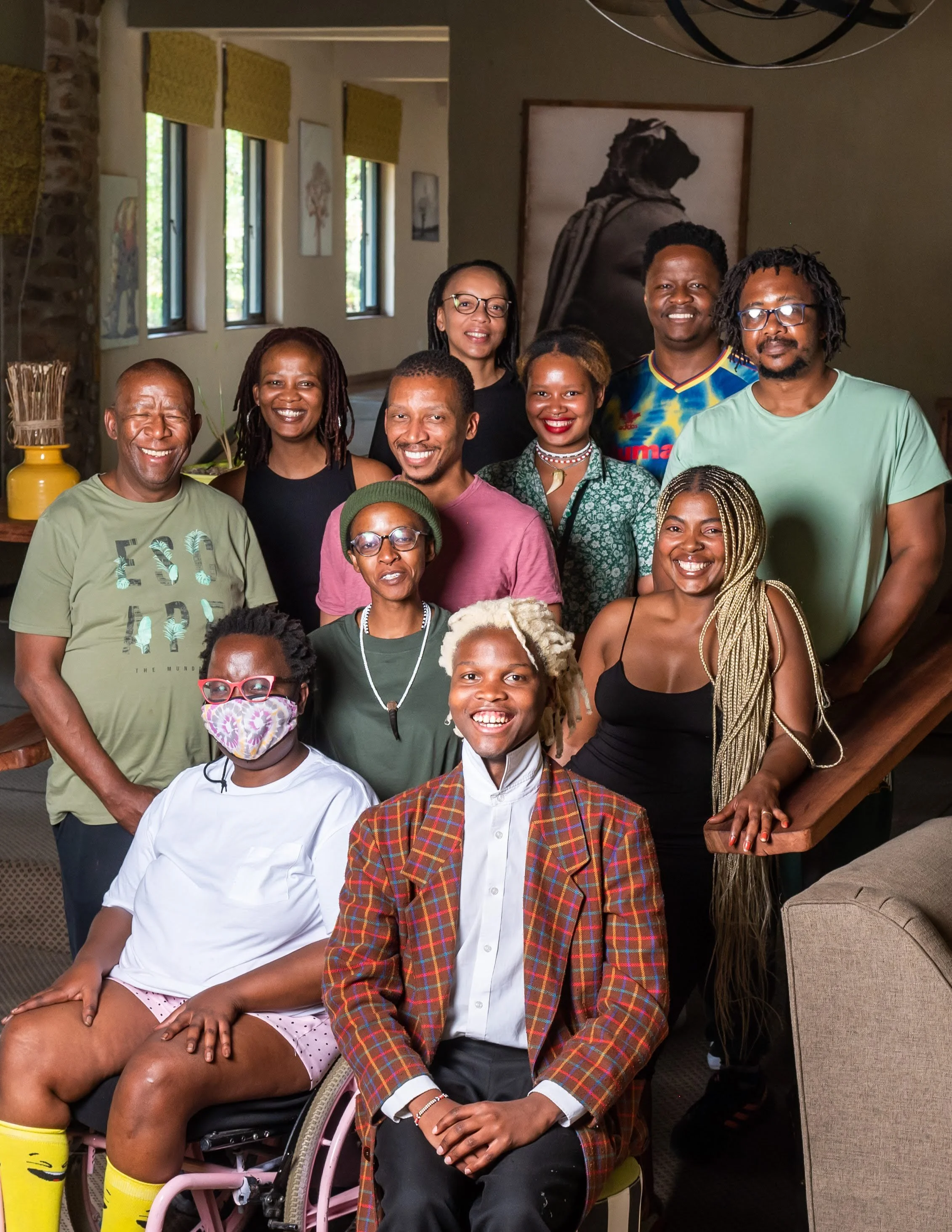On Retreats, Boat Rides and Accessibility
by Makgosi Letimile
CMC's writers-in-residence at our first retreat in October 2023 (Photo: Cwaka Sinxadi / Kwanda Photography).
I applied to Collective Media’s writer-in-residency programme in order to write a book about two subjects that I am really passionate about: accessibility and sexual pleasure. At a retreat in Muldersdrift, organised so our group of 16 writers can workshop our books together, I was excited to be in community with other writers but also to go on my first boat ride.
I have never been on a boat before. I had a very romantic view of what a sunset boat cruise would be like. But it was not to be. On our walk down to the boat, the road was riddled with speed humps that were too high for me to clear with my wheelchair. I remember having the other writers helping me and all I was doing was fat-shaming myself, thinking: “this would have been easier had I been skinnier.” We made it over the speed bumps and once we got to the dock, I needed help getting on the boat. I was scared, hoping that the people I am with will ensure I don't fall into the water. I felt my heart beating, and I was shaking even after I had sat safely on the boat.
Makgosi Letimile at the retreat. (Photo: Cwaka Sinxadi / Kwanda Photography).
Once on the boat, I felt lighter. The boat ride was easily my highlight of the trip. It felt so good to sit with a group of writers in the water, experiencing the beauty of nature. It felt like the boat ride was not about me, my disability and my problems. Being on the water crystalised just how small we are in the greater scheme of things. There is a beauty in realising that nature can go on without my intervention. I felt present on the boat, seeing the giraffes, talking about nature, and watching the sun set. This was the one place I felt I could be free. We were equal on the boat. I felt human and complete. It felt good to be in a place where we were all vulnerable to the water, for me as a wheelchair user to not be the center of attention. The boat ride convinced me that I wanted to take swimming lessons because at that moment I imagined myself jumping into the water, and taking a swim.
This moment was really a highlight as I spent a week in a place that advertised itself as being accessible but it turned out to be the complete opposite. Yes, there were ramps, but they were too steep to be usable. The shower was step free but the bathroom floors were too slippery and I had to ask for a shower chair. I remember entering my room for the first time and my wheelchair – which was a bright pink at the time – scratched the door, which was too narrow. My chair left pink marks all over the room as I struggled to make my way through the narrow spaces.
For a country that ratified, in November 2007, a legally binding international agreement that is supposed to ensure that disabled people enjoy the same rights as their non-disabled counterparts, South Africa has been very disappointing in its follow up on the promise to treat us as humanely as possible. Almost 20 years later, nothing has legally changed to ensure inclusivity.
Images taken from the boat ride by Makgosi Letimile.
As the only wheelchair user in a group of 16, I tried to make myself small, not to take up too much space, something that was almost impossible at this game lodge. As beautiful as the spaces were, they were inaccessible to me. In the moments where I was not in my room, I needed a companion for everything. I quickly realised I would need to get over my fear of asking for help, otherwise I would be stuck in my room for the whole week.
“Please push me up the ramp,” I would ask when outside.
“Please come get me from my room,” I would text in the Signal group before our sessions in the mornings.
“Please could someone take to the bathroom,” I would ask during team breaks.
I was afraid of coming across as demanding. My time was not my time anymore, the feeling of being a burden kept coming back every time I asked for assistance. It made me feel anxious. I felt like my disability was overshadowing the whole experience. I wanted people to pay attention to my ideas, to my thoughts, to my writing talent. Now, everybody was just focusing on the inconvenience and inaccessibility. I appreciated everyone’s willingness to help, but it was not meant to be part of the deal. I just wanted to have a restful experience. I also wanted to watch the sun rise, to join others on morning walks while hot air balloons dot the sky.
I felt like the desire to be seen as human and not my disability, overshadowed the retreat. I wasn't alone in my disability; I had to invite and inconvenience others for the systematic inconveniences. I have wondered since then, if all I am in the memories of the writers is a wheelchair-user who couldn't get around on her own. But I am more than my disability and the inaccessibility we all experienced. Ableism did not give us the privilege to hide our humanity and our need for each other, I hope that it translated into more than an inconvenient mutual experience and I hope it changes, eventually.
Makgosi Letimile is a disability inclusion consultant based in Cape Town.






